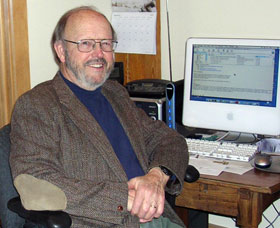  |
| HOME | THIS ISSUE | CALENDAR | GRANTS | BACK ISSUES | < BACK | NEXT > |
Faculty gift establishes graduate fellowship in family studiesby John Sponauer - March 19, 2007 | ||||
| Amid the pressures of changing gender roles, the impact of technology, and the reduced influence of traditional factors like religion, today’s families face unprecedented stresses. Frederick Humphrey, professor emeritus of human development and family studies, has seen these challenges evolve during more than four decades in the field. “I wouldn’t say there are more pressures on families today, but there are many different ones,” he says. “Families don’t exist in isolation, but are influenced by larger factors like the changing role of women, the growth of ‘trial marriages’ or living together, and the technologies of globalization, such as cell phones and the Internet.” Although he believes that some of these may result in stronger, lasting marriages, they may also introduce obstacles to relationships. During the past several decades, the field of marriage and family therapy has grown accordingly, to meet these and other new challenges. “Counseling is much more accepted today,” says Humphrey. “It’s not seen as a weakness. Forty-five years ago, the American Association for Marriage and Family Therapy was a handful of people. Today, it’s a nationwide group of licensed professionals. The field has grown and the availability of these services has increased.” To support UConn’s leadership of this growing field, Humphrey has funded a fellowship in family studies. The University previously renamed the Family Studies Clinic the Frederick G. Humphrey Center for Marital and Family Therapy. The new Dr. Frederick G. Humphrey Fellowship in Family Studies provides support for research and practice activities for exemplary graduate students in the Department of Human Development and Family Studies.
Humphrey says his experience in the department showed him that private support can dramatically affect the quality of graduate students at UConn. “I was the chairman of our graduate admission committee for several years, and I saw firsthand that we would lose talented students because other universities could offer more financial aid,” he says. “With my fellowship, I’d like to see regular awards made to strong students with good grades and a concern for people, and I would hope their career path then takes them into private practice, public service, or teaching and research.” Humphrey believes those closest to a particular field have a role in helping it grow, and he hopes his gift will illustrate that faculty can make a financial contribution to the University’s future success. “It would be nice if more faculty gave back some of the fruits of their labor to the University,” he says. “Because of our research,” Humphrey adds, “UConn’s family studies program is different from ordinary training in marital and family therapy. I’d like to see the University maintain that high level of output.” |
| ADVANCE HOME UCONN HOME |

